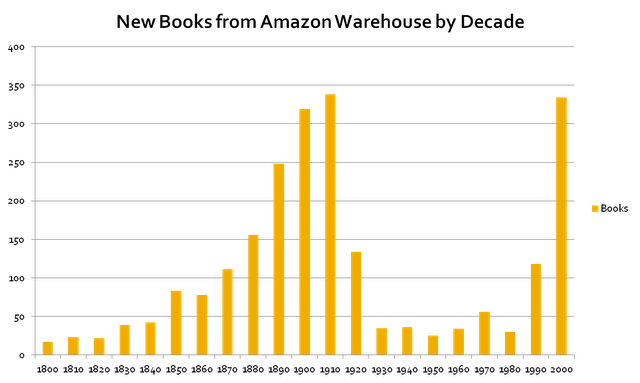The US government messed around with the copyright laws so that from 1998 until the end of this year, very little material was allowed to slip out of copyright protection and into the public domain. (Many people point their fingers at the Disney corporate lawyers and their pliable friends in Washington DC for this oddity.) In The Atlantic, Glenn Fleishman explains some of the legal issues that will finally begin to allow works to enter public domain status in the US normally next year:
The Great American Novel enters the public domain on January 1, 2019 — quite literally. Not the concept, but the book by William Carlos Williams. It will be joined by hundreds of thousands of other books, musical scores, and films first published in the United States during 1923. It’s the first time since 1998 for a mass shift to the public domain of material protected under copyright. It’s also the beginning of a new annual tradition: For several decades from 2019 onward, each New Year’s Day will unleash a full year’s worth of works published 95 years earlier.
This coming January, Charlie Chaplin’s film The Pilgrim and Cecil B. DeMille’s The 10 Commandments will slip the shackles of ownership, allowing any individual or company to release them freely, mash them up with other work, or sell them with no restriction. This will be true also for some compositions by Bela Bartok, Aldous Huxley’s Antic Hay, Winston Churchill’s The World Crisis, Carl Sandburg’s Rootabaga Pigeons, e.e. cummings’s Tulips and Chimneys, Noël Coward’s London Calling! musical, Edith Wharton’s A Son at the Front, many stories by P.G. Wodehouse, and hosts upon hosts of forgotten works, according to research by the Duke University School of Law’s Center for the Study of the Public Domain.
Throughout the 20th century, changes in copyright law led to longer periods of protection for works that had been created decades earlier, which altered a pattern of relatively brief copyright protection that dates back to the founding of the nation. This came from two separate impetuses. First, the United States had long stood alone in defining copyright as a fixed period of time instead of using an author’s life plus a certain number of years following it, which most of the world had agreed to in 1886. Second, the ever-increasing value of intellectual property could be exploited with a longer term.
Here’s a graphical representation of how the copyright laws interact with Amazon’s ability/interest in stocking or otherwise making available older still-in-copyright works (graphic from 2015):
So, what’s the Disney connection?
The details of copyright law get complicated fast, but they date back to the original grant in the Constitution that gives Congress the right to bestow exclusive rights to a creator for “limited times.” In the first copyright act in 1790, that was 14 years, with the option to apply for an automatically granted 14-year renewal. By 1909, both terms had grown to 28 years. In 1976, the law was radically changed to harmonize with the Berne Convention, an international agreement originally signed in 1886. This switched expiration to an author’s life plus 50 years. In 1998, an act named for Sonny Bono, recently deceased and a defender of Hollywood’s expansive rights, bumped that to 70 years.
The Sonny Bono Act was widely seen as a way to keep Disney’s Steamboat Willie from slipping into the public domain, which would allow that first appearance of Mickey Mouse in 1928 from being freely copied and distributed. By tweaking the law, Mickey got another 20-year reprieve. When that expires, Steamboat Willie can be given away, sold, remixed, turned pornographic, or anything else. (Mickey himself doesn’t lose protection as such, but his graphical appearance, his dialog, and any specific behavior in Steamboat Willie — his character traits — become likewise freely available. This was decided in a case involving Sherlock Holmes in 2014.)
The reason that New Year’s Day 2019 has special significance arises from the 1976 changes in copyright law’s retroactive extensions. First, the 1976 law extended the 56-year period (28 plus an equal renewal) to 75 years. That meant work through 1922 was protected until 1998. Then, in 1998, the Sonny Bono Act also fixed a period of 95 years for anything placed under copyright from 1923 to 1977, after which the measure isn’t fixed, but based on when an author perishes. Hence the long gap from 1998 until now, and why the drought’s about to end.




